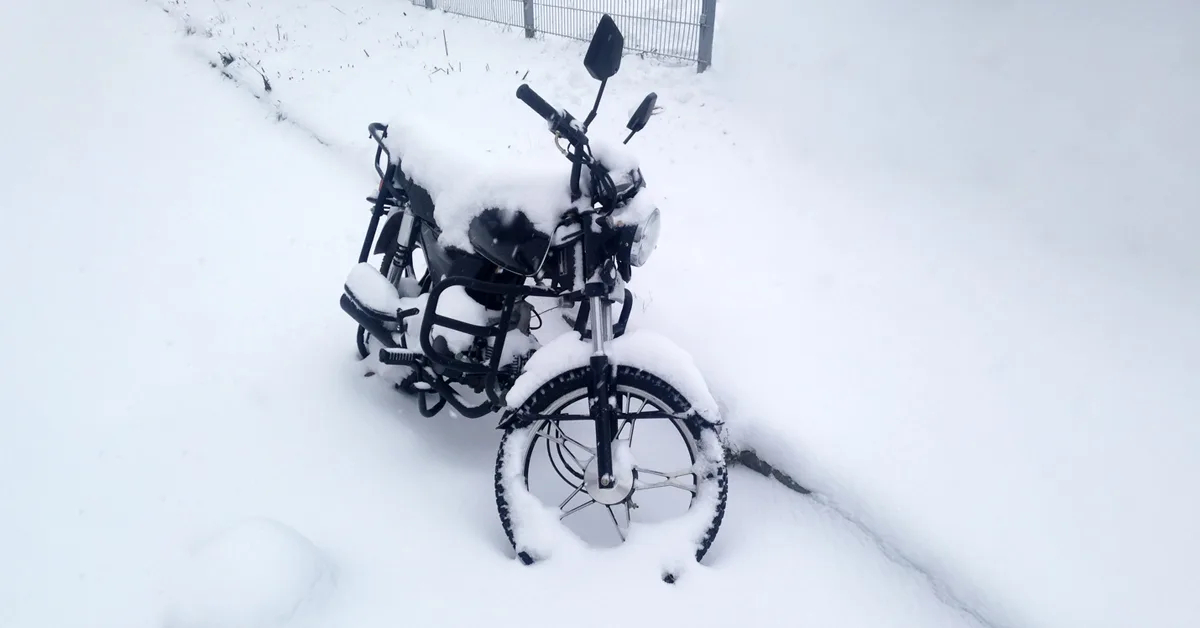Riding in the winter is challenging and exciting. Learn how to stay safe and protect your bike with these 9 essential tips, covering everything from gear to road conditions and maintenance. Enjoy the thrill of winter riding worry-free!

Winter riding can be a thrilling experience, but it also comes with its own set of challenges. From icy roads to freezing temperatures, winter riding requires extra precautions to ensure your safety and the safety of your bike.
In this article, we’ll share 9 winter riding tips that will keep you from filing a bike insurance claim and help you enjoy your winter ride to the fullest.
Why Is Winter Riding Different?
Riding in winter is not the same as riding in other seasons. The cold weather, snow, and ice can make the roads more dangerous and increase the risk of accidents. Additionally, the salt and sand used to de-ice roads can cause damage to your bike.
Road Conditions
Winter roads can be unpredictable, with snow, ice, and slush making it difficult to maintain control of your bike. It’s important to be aware of the road conditions and adjust your riding accordingly.
Avoid riding on roads that have not been cleared or salted, as they can be extremely slippery. Stick to main roads that are regularly maintained and avoid back roads or shortcuts that may not be safe for winter riding.
Bike Maintenance
The cold weather can also affect the performance of your bike. It’s important to regularly check and maintain your bike to ensure it is in top condition for winter riding.
Make sure to check your tire pressure, as cold weather can cause it to decrease. Also, check your brakes and make sure they are functioning properly. It’s also a good idea to lubricate your bike chain to prevent it from rusting due to the salt and sand on the roads.
9 Winter Riding Tips
1. Invest in Winter Tires
Winter tires are specifically designed to provide better traction and control in snowy and icy conditions. They have a deeper tread and are made of a softer rubber, which allows them to grip the road better in cold weather.
Investing in winter tires can greatly improve your safety and reduce the risk of accidents while riding in winter. They may be an additional expense, but they are worth it for the added peace of mind and safety they provide.
2. Wear Appropriate Gear
Dressing appropriately for winter riding is crucial. Make sure to wear layers to keep yourself warm and dry. A waterproof and windproof outer layer is essential to protect you from the elements.
Invest in a good pair of winter gloves that will keep your hands warm and allow you to maintain a good grip on the handlebars. A balaclava or face mask can also help protect your face from the cold wind.
3. Use Add-Ons
There are several add-ons you can use to make your bike more winter-friendly. Fenders can help keep snow and slush from splashing onto you and your bike. Heated grips can also be a great addition to keep your hands warm while riding.
Another useful add-on is a windshield, which can provide protection from the cold wind and snow. These add-ons may require an additional investment, but they can greatly improve your winter riding experience.
4. Check Your Lights
With shorter days and longer nights, it’s important to make sure your lights are working properly. Check your headlights, taillights, and turn signals to ensure they are functioning correctly.
It’s also a good idea to carry spare bulbs with you in case one burns out while you’re on the road. Proper lighting is crucial for your safety and the safety of other drivers on the road.
5. Plan Your Route
Before heading out for a winter ride, make sure to plan your route carefully. Avoid roads that are known to be dangerous in winter conditions, such as steep hills or winding roads.
Stick to main roads that are regularly maintained and have less traffic. It’s also a good idea to plan for rest stops along the way to warm up and take a break from the cold.
6. Be Aware of Black Ice
Black ice is a thin layer of ice that forms on the road and is difficult to see. It can be extremely dangerous for riders, as it can cause them to lose control of their bike.
Be aware of areas where black ice is likely to form, such as bridges, overpasses, and shaded areas. Slow down and use caution when approaching these areas to avoid accidents.
7. Avoid Riding in Extreme Weather
While winter riding can be exhilarating, it’s important to know when to call it quits. If the weather becomes too extreme, with heavy snow or freezing rain, it’s best to avoid riding altogether.
Riding in extreme weather conditions can be dangerous and increase the risk of accidents. It’s better to wait for the weather to improve before heading out on your bike.
8. Keep Your Bike Covered
When not in use, make sure to keep your bike covered to protect it from the elements. This is especially important if you don’t have access to a garage or covered parking.
A bike cover can help protect your bike from snow, rain, and other winter weather conditions. It can also help prevent rust and damage caused by salt and sand on the roads.
9. Consider Bike Insurance
Even with all the precautions and safety measures in place, accidents can still happen. That’s why it’s important to consider bike insurance, especially during winter riding.
Bike insurance can provide coverage for damages to your bike, medical expenses, and liability in case of an accident. It can also provide coverage for theft or damage caused by natural disasters.





